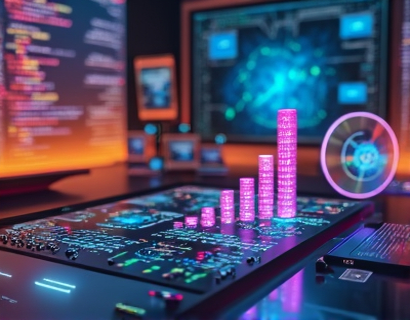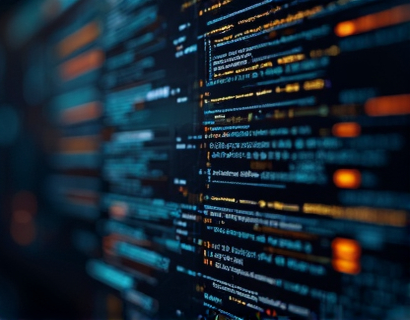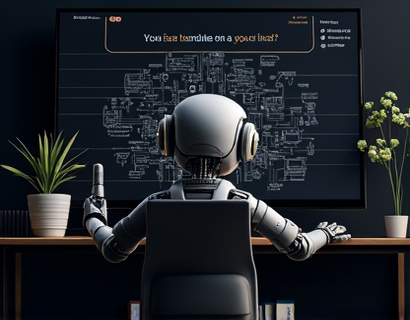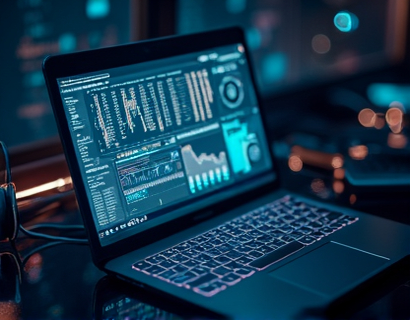AI and Crypto: Pioneering the Next Generation of Fintech
The intersection of artificial intelligence and cryptocurrency is revolutionizing the financial technology sector, ushering in a new era of innovation, efficiency, and security. This convergence is not just a trend but a fundamental shift in how we perceive and interact with digital finance. As tech-savvy crypto enthusiasts and fintech innovators, understanding this synergy is crucial for anyone looking to stay ahead in the rapidly evolving landscape of digital currencies and intelligent systems.
Evolving Financial Landscapes
The traditional financial systems, while robust, are often characterized by their rigidity and slow adaptation to technological advancements. The introduction of blockchain technology and cryptocurrencies has disrupted this status quo, offering decentralized, transparent, and secure alternatives. However, the true potential of these technologies is being unlocked through the integration of artificial intelligence. AI brings a level of sophistication and intelligence that enhances the functionality and user experience of crypto-based solutions.
Enhanced Security Measures
One of the most significant benefits of combining AI and crypto is the enhancement of security protocols. Traditional banking systems rely heavily on centralized security measures, which, despite their complexity, are vulnerable to breaches and fraud. AI-driven systems can analyze vast amounts of data in real-time, identifying patterns and anomalies that indicate potential security threats. Machine learning algorithms continuously learn from new data, improving their ability to detect and prevent fraudulent activities. This proactive approach to security is a game-changer for crypto transactions, making them safer and more reliable.
Personalized Financial Services
AI's ability to process and analyze large datasets allows for the creation of highly personalized financial services. In the crypto space, this means tailored investment advice, customized portfolio management, and personalized risk assessment. AI algorithms can analyze a user's financial behavior, market trends, and personal preferences to provide recommendations that are finely tuned to individual needs. This level of personalization is unprecedented in traditional finance, where services are often one-size-fits-all. The result is a more engaging and effective financial experience for users.
Streamlined Operations and Efficiency
The operational efficiency of financial institutions can be significantly improved through AI integration. Automation of routine tasks such as transaction processing, compliance checks, and customer service inquiries reduces the workload on human staff, minimizing errors and increasing speed. AI chatbots and virtual assistants can handle a wide range of customer interactions, providing instant responses and support around the clock. For crypto platforms, this means faster transaction times, lower fees, and a smoother user experience. The backend operations of exchanges and wallets become more efficient, reducing costs and enhancing scalability.
Smart Contracts and Automated Agreements
Smart contracts, self-executing contracts with the terms directly written into code, are a prime example of AI's impact on crypto. These contracts automatically enforce and execute agreements when predefined conditions are met, eliminating the need for intermediaries. AI can further optimize smart contracts by analyzing historical data and predicting outcomes, ensuring that the terms are fair and the execution is seamless. This automation not only speeds up processes but also reduces the risk of human error and fraud.
Market Predictions and Trading Strategies
AI's predictive analytics capabilities are transforming how traders approach the crypto market. By analyzing vast datasets, including historical price movements, news sentiment, and social media trends, AI can identify patterns and make accurate predictions about market behavior. This information can be used to develop sophisticated trading strategies, from algorithmic trading to hedging and arbitrage. Traders can leverage AI to gain a competitive edge, making more informed decisions and potentially increasing their returns.
Regulatory Compliance and Transparency
The regulatory landscape for crypto is complex and evolving. AI can help navigate this landscape by ensuring compliance with various regulations across different jurisdictions. AI systems can monitor transactions and user activities to detect and prevent illegal activities such as money laundering and terrorist financing. Additionally, AI can provide transparent reporting and auditing, building trust with regulators and users alike. This level of transparency is crucial for the long-term adoption and legitimacy of crypto in the mainstream financial system.
User Experience and Accessibility
AI-driven interfaces can significantly enhance the user experience for crypto platforms. Natural language processing and voice recognition technologies make it easier for users to interact with digital assets, reducing the learning curve and making crypto more accessible to a broader audience. AI can also personalize the user interface based on individual preferences and usage patterns, creating a more intuitive and user-friendly environment. This focus on user experience is essential for attracting and retaining users in a competitive market.
Challenges and Considerations
While the integration of AI and crypto offers numerous benefits, it also presents challenges that must be addressed. One of the primary concerns is the ethical use of AI, particularly in terms of data privacy and the potential for bias in algorithms. Ensuring that AI systems are transparent, fair, and secure is paramount. Additionally, the technical complexity of AI can be a barrier for some users and developers, requiring robust educational resources and support. Regulatory frameworks must also evolve to keep pace with these technological advancements, providing clear guidelines and protections for all stakeholders.
Future Prospects
The future of fintech is bright, with AI and crypto at the forefront of innovation. As technology continues to advance, we can expect even more sophisticated applications of AI in the crypto space. From decentralized finance (DeFi) platforms that offer traditional banking services without intermediaries to blockchain-based identity verification systems, the possibilities are vast. The synergy between AI and crypto is not just about enhancing existing services but about creating entirely new paradigms in financial inclusion, investment, and economic empowerment.
For tech and finance innovators, the convergence of AI and crypto represents a golden opportunity to be part of a transformative movement. By embracing these technologies, they can develop solutions that are not only cutting-edge but also socially responsible and user-centric. The journey ahead is exciting, and those who lead the way will shape the future of digital finance.










































